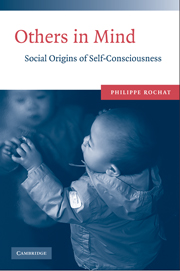Book contents
- Frontmatter
- Contents
- Foreword by Jerôme Bruner
- Preface
- Introduction: Main Ideas
- 1 Self-Conscious Species
- 2 Six Propositions
- 3 Varieties of Self-Reflective Mind State
- 4 Mind States in Development
- 5 Birth of Self-Consciousness
- 6 Shame and Self-Knowledge
- 7 The Roots of Guilt
- 8 Giving and Sharing
- 9 Origins of Owning and Sharing
- 10 Social Construction of Identity
- Conclusion: Moral Space and the Self
- Postscript Note
- References
- Index
5 - Birth of Self-Consciousness
Published online by Cambridge University Press: 05 August 2012
- Frontmatter
- Contents
- Foreword by Jerôme Bruner
- Preface
- Introduction: Main Ideas
- 1 Self-Conscious Species
- 2 Six Propositions
- 3 Varieties of Self-Reflective Mind State
- 4 Mind States in Development
- 5 Birth of Self-Consciousness
- 6 Shame and Self-Knowledge
- 7 The Roots of Guilt
- 8 Giving and Sharing
- 9 Origins of Owning and Sharing
- 10 Social Construction of Identity
- Conclusion: Moral Space and the Self
- Postscript Note
- References
- Index
Summary
The self has always been an elusive, difficult, and still highly controversial concept in the realm of both philosophy and psychology. It continues to be elusive in the context of the new wave of cognitive neurosciences. In this chapter, I would like to discuss this concept from a developmental perspective, in particular in light of new research on the self in infancy. This research is irreplaceable in discussing the self in relation to the various states of mind I reviewed earlier, in particular in relation to consciousness and co-consciousness.
Developmental facts point to the basic ingredients of self-knowledge as it unfolds in the course of early ontogeny. Developmental research provides empirical ground and is a privileged terrain of reflection on what it takes to be self-conscious, the psychological implications of self-consciousness, which are of interest here.
When do children have a sense of themselves as a differentiated and unique entity in the world? When and how do they become self-conscious and co-conscious of themselves in relation to others? In response to these questions, it is judicious to discern various levels of self-knowledge as they appear to unfold chronologically from the moment of birth to approximately four to five years of age. The focus here is on this emergence as a way of deconstructing the meaning of human self-consciousness.
The developmental approach allows us to observe how basic competencies emerge and come online.
- Type
- Chapter
- Information
- Others in MindSocial Origins of Self-Consciousness, pp. 86 - 104Publisher: Cambridge University PressPrint publication year: 2009



